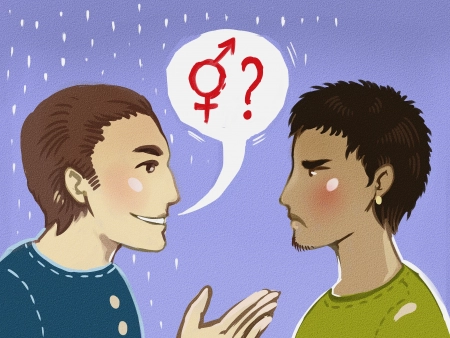
В Азербайджане врачи отказываются работать с транс-людьми
Азербайджан
[lang=ru]В закладки[/lang][lang=az]Əlfəcin[/lang]
Из-за ограниченного или совсем отсутствующего доступа к системе здравоохранения транс-люди в Азербайджане вынуждены выбирать между гендерной дисфорией и самостоятельной гормональной терапией.
«У меня прекратились менструации, на лице начали расти волосы, моя мать догадалась об этом, и из-за этого семья применила ко мне физическое насилие. Мне пришлось сбежать в Баку посреди ночи», - вспоминает Девран Ибрагимсой, 25-летний транс-мужчина из Шамкира.
Два года Девран проходит гормональную терапию и страдает от серьёзных болезненных побочных эффектов. В то время, когда должен идти менструальный цикл, у него начинаются невыносимые головные боли.
Он говорит, что у гормонов сильные побочные эффекты; из-за некоторых его кожа становится более жирной или приобретает специфический запах, перемещается подкожный жир в области груди, ягодиц и бёдер.
«Один из моих друзей мучился от сильного запаха, у другого сильно выпадали волосы. У меня после трёх месяцев терапии были проблемы с подъязычной костью», - рассказывает он.
Дерван беспокоится, что последствия гормональной терапии могут отрицательно сказаться на его внутренних органах, в том числе печени.
Как большинство решившихся на переход в Азербайджане, Девран совершает его без наблюдения врача.

Лекарства из чёрного рынка
Турана Нури, ЛГБТК-активист из Азербайджана, которая работает с транс-комьюнити в стране и за её пределами, рассказала, что в стране есть несколько врачей, которые хотели бы работать с транс-людьми, но они вынуждены это скрывать.
«Эндокринологи в Азербайджане обычно не хотят работать с транс-людьми», - говорит она и добавляет, что найти подходящего специалиста гораздо легче в Турции или Иране, но позволить себе это могут далеко не все.
Нури говорит, что большинство транс-людей, с которыми она общалась, начинали гормональную терапию самостоятельно.
«Гормоны обычно покупают на чёрном рынке, потому что эндокринолога, который подписал бы правильную дозу, нет, отсюда высокий риск принять препарат в неправильной дозировке», - объясняет она.
В азербайджанских аптеках пропадают два таких препарата, тестостерона энантат и тестостерона пропионат. Пропионат относительно дешёвый, поскольку в нём содержится мало тестостерона, но приобрести его можно только по рецепту.
Стоимость тестостерона энантата варьируется от 15 до 20 манатами ($9–$12) за одну дозу, которую нужно колоть раз в неделю.
Когда Девран не может найти первый препарат, он покупает пять доз пропионата и вкалывает их одним шприцом.
«Мне повезло с другом, который продаёт мне их из-под прилавка. Многим приходится привозить лекарства из-за границы», - говорит он.
Среди побочных эффектов, указанных в описании этих препаратов, указаны тошнота, рвота, головные боли, изменение цвета кожи, увеличение или ослабление либидо, жирная кожа, потеря волос, акне, ускоренное развитие субклинических раковых заболеваний, развитие доброкачественных и злокачественных опухолей печени, печёночная или почечная недостаточность, сердечная недостаточность, нарушения в системе свёртываемости крови и другие.
Из-за этого, по словам правозащитников, возник чёрный рынок, где торгуют нераспроданными препараты из международных складов.

«Трудно найти врача, который даст осознанное согласие выписать гормональное лечение»
Шота Джанджгава, энокринолог и андролог грузинского Национального института эндокринологии в Тбилиси, рассказал, что перед тем, как начать гормональную терапию, необходимо пройти обследование психического здоровья и измерить гормональный фон.
По его словам, многие ожидают быстрой смена гормонального фона, однако важно помнить, что степень изменений и их скорость зависит от многих факторов, в том числе генетики и возраста, в которой они начинают принимать гормоны.
По словам Джанджгавы, риск возникновения тромба, а также сердечного приступа, инсульта, диабета и рака из-за гормональной терапии минимален, но повышен у тех, у кого уже есть проблемы со здоровьем или кто начинает принимать гормоны после 50 лет.
«В общем, для тех, у кого здоровье хорошее, риск минимальный и может компенсироваться улучшением качества жизни и снижением уровня стресса после начала гормональной терапии», - говорит он.
Джанджгава считает, что доступ к гормонам - это основа заботы о здоровье транс-людей. «Доступ к препаратам оказывает позитивное влияние на благополучие тех, кто решает принимать гормоны - не все транс-люди хотят этого».
«Из-за этого у транс-людей более низкий уровень тревоги, депрессии, склонности к суициду, это нечто большее, чем просто удовольствие без боли», — говорит Джанджгава.
Он отметил, что для транс-людей возможность обратиться за помощью важная не только тем, что улучшит физическое самочувствие - она важна для ощущения физической неприкосновенности и самоактуализации.
«Хотя в литературе о транс-переходе и работникам здравоохранения, которые на нём специализируются, об этом хорошо известно, всё ещё трудно найти врача, который даст осознанное согласие прописать гормональное лечение».

Гормональная терапия не временна - она навсегда
Проблемы Деврана не заканчиваются на том, что ему не удалось найти доктора, который мог бы следить за его переходом.
Из-за своего внешнего облика Деврану трудно посещать многих из нужных ему врачей.
«Когда я иду на рентген, например, они могут увидеть мои яичники, и я никогда не уверен, как доктор отреагирует».
«Иногда я не знаю, как отвечать на их вопросы. Я сдаю тесты на кровь, они видят, что у меня в крови высокое содержание эстрогена. Они посылают меня к андрологу, и я снова не знаю, как себя вести, когда там меня попросят снять штаны», - говорит он.
После нескольких неприятных разговоров с врачами (несколько даже отказались его принять) он больше не посещает гинеколога.
Ситуацию в Азербайджане Девран сравнивает в соседней Турцией, где транс-люди могут устроиться на работу, а страховые компании покрывают стоимость их операций и лекарств.
«До пандемии я не сталкивался с проблемами, все было здорово. Потом у меня пропал источник дохода, и мне пришлось прекратить терапию, я не мог сдавать тесты, это ограничило меня», - говорит Девран.
Для людей, совершающих переход, гормональная терапия не временна — она навсегда. Если человек вынужден резко её прекратить из-за проблем с деньгами или здоровьем, гормональный фон в организме меняется, что может сильно повлиять на здоровье.
Когда Девран прекратил принимать гормоны, у него начались проблемы с печенью и сердцем, говорит он.
«Моё психическое здоровье разрушено, я больше себя не узнаю. Но я всё ещё надеюсь, что смогу из этого выбраться».
Gay.Az/Salam.gay/oc-media.org
«У меня прекратились менструации, на лице начали расти волосы, моя мать догадалась об этом, и из-за этого семья применила ко мне физическое насилие. Мне пришлось сбежать в Баку посреди ночи», - вспоминает Девран Ибрагимсой, 25-летний транс-мужчина из Шамкира.
Два года Девран проходит гормональную терапию и страдает от серьёзных болезненных побочных эффектов. В то время, когда должен идти менструальный цикл, у него начинаются невыносимые головные боли.
Он говорит, что у гормонов сильные побочные эффекты; из-за некоторых его кожа становится более жирной или приобретает специфический запах, перемещается подкожный жир в области груди, ягодиц и бёдер.
«Один из моих друзей мучился от сильного запаха, у другого сильно выпадали волосы. У меня после трёх месяцев терапии были проблемы с подъязычной костью», - рассказывает он.
Дерван беспокоится, что последствия гормональной терапии могут отрицательно сказаться на его внутренних органах, в том числе печени.
Как большинство решившихся на переход в Азербайджане, Девран совершает его без наблюдения врача.

Лекарства из чёрного рынка
Турана Нури, ЛГБТК-активист из Азербайджана, которая работает с транс-комьюнити в стране и за её пределами, рассказала, что в стране есть несколько врачей, которые хотели бы работать с транс-людьми, но они вынуждены это скрывать.
«Эндокринологи в Азербайджане обычно не хотят работать с транс-людьми», - говорит она и добавляет, что найти подходящего специалиста гораздо легче в Турции или Иране, но позволить себе это могут далеко не все.
Нури говорит, что большинство транс-людей, с которыми она общалась, начинали гормональную терапию самостоятельно.
«Гормоны обычно покупают на чёрном рынке, потому что эндокринолога, который подписал бы правильную дозу, нет, отсюда высокий риск принять препарат в неправильной дозировке», - объясняет она.
В азербайджанских аптеках пропадают два таких препарата, тестостерона энантат и тестостерона пропионат. Пропионат относительно дешёвый, поскольку в нём содержится мало тестостерона, но приобрести его можно только по рецепту.
Стоимость тестостерона энантата варьируется от 15 до 20 манатами ($9–$12) за одну дозу, которую нужно колоть раз в неделю.
Когда Девран не может найти первый препарат, он покупает пять доз пропионата и вкалывает их одним шприцом.
«Мне повезло с другом, который продаёт мне их из-под прилавка. Многим приходится привозить лекарства из-за границы», - говорит он.
Среди побочных эффектов, указанных в описании этих препаратов, указаны тошнота, рвота, головные боли, изменение цвета кожи, увеличение или ослабление либидо, жирная кожа, потеря волос, акне, ускоренное развитие субклинических раковых заболеваний, развитие доброкачественных и злокачественных опухолей печени, печёночная или почечная недостаточность, сердечная недостаточность, нарушения в системе свёртываемости крови и другие.
Из-за этого, по словам правозащитников, возник чёрный рынок, где торгуют нераспроданными препараты из международных складов.

«Трудно найти врача, который даст осознанное согласие выписать гормональное лечение»
Шота Джанджгава, энокринолог и андролог грузинского Национального института эндокринологии в Тбилиси, рассказал, что перед тем, как начать гормональную терапию, необходимо пройти обследование психического здоровья и измерить гормональный фон.
По его словам, многие ожидают быстрой смена гормонального фона, однако важно помнить, что степень изменений и их скорость зависит от многих факторов, в том числе генетики и возраста, в которой они начинают принимать гормоны.
По словам Джанджгавы, риск возникновения тромба, а также сердечного приступа, инсульта, диабета и рака из-за гормональной терапии минимален, но повышен у тех, у кого уже есть проблемы со здоровьем или кто начинает принимать гормоны после 50 лет.
«В общем, для тех, у кого здоровье хорошее, риск минимальный и может компенсироваться улучшением качества жизни и снижением уровня стресса после начала гормональной терапии», - говорит он.
Джанджгава считает, что доступ к гормонам - это основа заботы о здоровье транс-людей. «Доступ к препаратам оказывает позитивное влияние на благополучие тех, кто решает принимать гормоны - не все транс-люди хотят этого».
«Из-за этого у транс-людей более низкий уровень тревоги, депрессии, склонности к суициду, это нечто большее, чем просто удовольствие без боли», — говорит Джанджгава.
Он отметил, что для транс-людей возможность обратиться за помощью важная не только тем, что улучшит физическое самочувствие - она важна для ощущения физической неприкосновенности и самоактуализации.
«Хотя в литературе о транс-переходе и работникам здравоохранения, которые на нём специализируются, об этом хорошо известно, всё ещё трудно найти врача, который даст осознанное согласие прописать гормональное лечение».

Гормональная терапия не временна - она навсегда
Проблемы Деврана не заканчиваются на том, что ему не удалось найти доктора, который мог бы следить за его переходом.
Из-за своего внешнего облика Деврану трудно посещать многих из нужных ему врачей.
«Когда я иду на рентген, например, они могут увидеть мои яичники, и я никогда не уверен, как доктор отреагирует».
«Иногда я не знаю, как отвечать на их вопросы. Я сдаю тесты на кровь, они видят, что у меня в крови высокое содержание эстрогена. Они посылают меня к андрологу, и я снова не знаю, как себя вести, когда там меня попросят снять штаны», - говорит он.
Читайте также: 8 фактов о правах ЛГБТ и ВИЧ в Азербайджане
После нескольких неприятных разговоров с врачами (несколько даже отказались его принять) он больше не посещает гинеколога.
Ситуацию в Азербайджане Девран сравнивает в соседней Турцией, где транс-люди могут устроиться на работу, а страховые компании покрывают стоимость их операций и лекарств.
«До пандемии я не сталкивался с проблемами, все было здорово. Потом у меня пропал источник дохода, и мне пришлось прекратить терапию, я не мог сдавать тесты, это ограничило меня», - говорит Девран.
Для людей, совершающих переход, гормональная терапия не временна — она навсегда. Если человек вынужден резко её прекратить из-за проблем с деньгами или здоровьем, гормональный фон в организме меняется, что может сильно повлиять на здоровье.
Когда Девран прекратил принимать гормоны, у него начались проблемы с печенью и сердцем, говорит он.
«Моё психическое здоровье разрушено, я больше себя не узнаю. Но я всё ещё надеюсь, что смогу из этого выбраться».
Gay.Az/Salam.gay/oc-media.org
[lang=ru]Комментарии[/lang][lang=az]Şərhlər [/lang] (0)

 [/lang][lang=az]
[/lang][lang=az] [/lang][lang=en]
[/lang][lang=en] [/lang]
[/lang]








